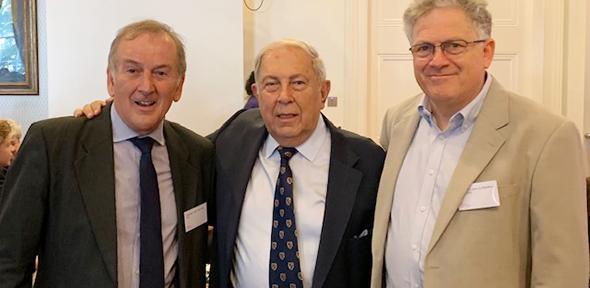
Congratulations to department alumnus Dr Yusuf K Hamied, who has been elected an Honorary Fellow of the Royal Society.
Honorary Fellowship is awarded to candidates who have given distinguished service to the cause of science. Dr Hamied is pictured at the Royal Society's Admissions Day ceremony in July 2019, flanked by our colleagues Professor John Pyle and Professor Jeremy Sanders, both themselves Fellows of the Royal Society.
Dr Hamied came to Cambridge to study Natural Sciences in 1954, and stayed to complete his PhD with Lord Todd.
Later, as CEO and Chair of the Indian pharmaceutical firm Cipla, Dr Hamied campaigned to provide low-cost generic antiretrovirals to people primarily in sub-Saharan Africa with HIV and Aids, reducing the cost from \$15,000 to \$350 per year, or under a dollar a day. These actions saved millions of lives, and were memorialised in the internationally acclaimed documentary Fire in the Blood.
In recognition of his pioneering and socially conscious actions, Dr Hamied was awarded the first ever Department of Chemistry Alumni Medal in 2016 "for services to the community that have brought honour to the Department of Chemistry."
As an alumnus, Dr Hamied has donated generously to the Department in many areas, including the creation of the Todd-Hamied Meeting Room, named in honour of Lord Todd, and the Yusuf Hamied Laboratory for Chemical Synthesis & Catalysis, which opened in September 2015. Most recently Dr Hamied has supported the 1702 Chair of Chemistry at Cambridge – one of the longest-established Chemistry Chairs in the UK - which has been renamed the Yusuf Hamied 1702 Chair of Chemistry in his honour.
Head of Department Dr James Keeler said: "The election of Dr Hamied as an Honorary Fellow of the Royal Society is a fitting tribute to his outstanding contributions across many fields. We are so proud to be able to count him as an alumnus - and a friend of the Department.
The Royal Society is a Fellowship of many of the world’s most eminent scientists and is the oldest scientific academy in continuous existence. The Society’s fundamental purpose, reflected in its founding Charters of the 1660s, is to recognise, promote and support excellence in science, and to encourage the development and use of science for the benefit of humanity.
Fellows are elected for life through a peer review process on the basis of excellence in science. Each year up to 52 Fellows and up to 10 Foreign Members are elected from a group of around 700 candidates who are proposed by the existing Fellowship.
Dr Venki Ramakrishnan, President of the Royal Society, said: “Over the course of the Royal Society’s vast history, it is our Fellowship that has remained a constant thread and the substance from which our purpose has been realised: to use science for the benefit of humanity. It is with great honour that I welcome them as Fellows of the Royal Society."
Dr Hamied was formally admitted to the Royal Society at the Admissions Day ceremony in July, where he signed the Charter Book and the Obligation of the Fellows of the Royal Society.
